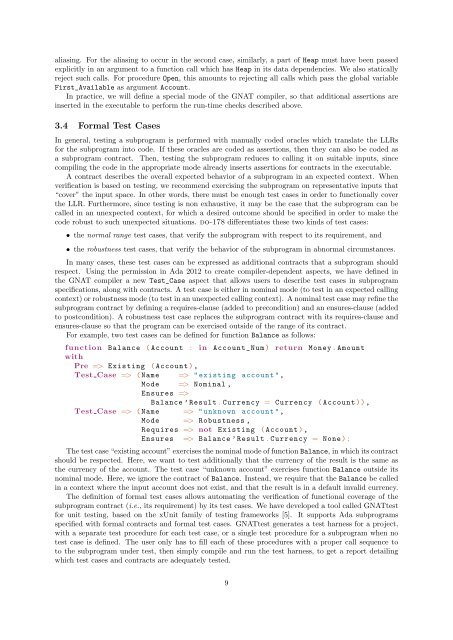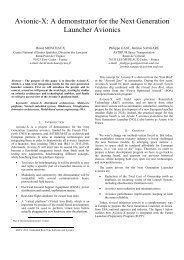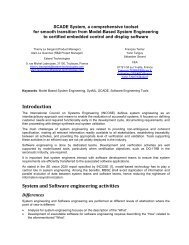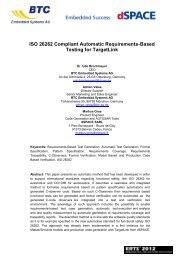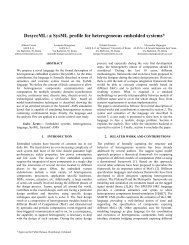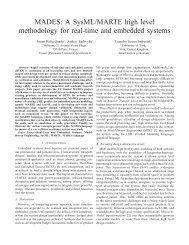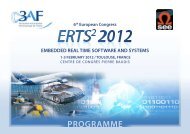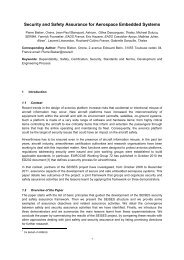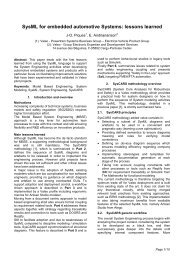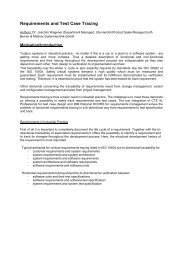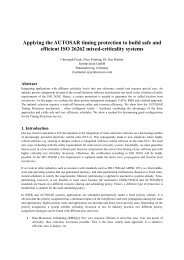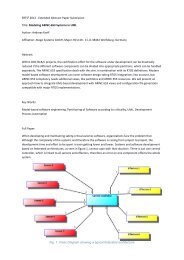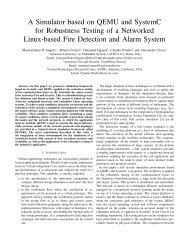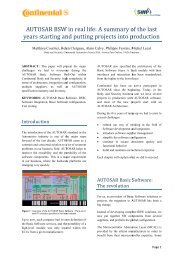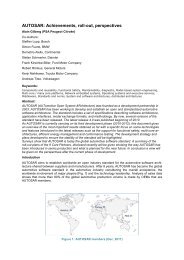Integrating Formal Program Verification with Testing
Integrating Formal Program Verification with Testing
Integrating Formal Program Verification with Testing
- No tags were found...
Create successful ePaper yourself
Turn your PDF publications into a flip-book with our unique Google optimized e-Paper software.
aliasing. For the aliasing to occur in the second case, similarly, a part of Heap must have been passedexplicitly in an argument to a function call which has Heap in its data dependencies. We also staticallyreject such calls. For procedure Open, this amounts to rejecting all calls which pass the global variableFirst_Available as argument Account.In practice, we will define a special mode of the GNAT compiler, so that additional assertions areinserted in the executable to perform the run-time checks described above.3.4 <strong>Formal</strong> Test CasesIn general, testing a subprogram is performed <strong>with</strong> manually coded oracles which translate the LLRsfor the subprogram into code. If these oracles are coded as assertions, then they can also be coded asa subprogram contract. Then, testing the subprogram reduces to calling it on suitable inputs, sincecompiling the code in the appropriate mode already inserts assertions for contracts in the executable.A contract describes the overall expected behavior of a subprogram in an expected context. Whenverification is based on testing, we recommend exercising the subprogram on representative inputs that“cover” the input space. In other words, there must be enough test cases in order to functionally coverthe LLR. Furthermore, since testing is non exhaustive, it may be the case that the subprogram can becalled in an unexpected context, for which a desired outcome should be specified in order to make thecode robust to such unexpected situations. do-178 differentiates these two kinds of test cases:• the normal range test cases, that verify the subprogram <strong>with</strong> respect to its requirement, and• the robustness test cases, that verify the behavior of the subprogram in abnormal circumstances.In many cases, these test cases can be expressed as additional contracts that a subprogram shouldrespect. Using the permission in Ada 2012 to create compiler-dependent aspects, we have defined inthe GNAT compiler a new Test_Case aspect that allows users to describe test cases in subprogramspecifications, along <strong>with</strong> contracts. A test case is either in nominal mode (to test in an expected callingcontext) or robustness mode (to test in an unexpected calling context). A nominal test case may refine thesubprogram contract by defining a requires-clause (added to precondition) and an ensures-clause (addedto postcondition). A robustness test case replaces the subprogram contract <strong>with</strong> its requires-clause andensures-clause so that the program can be exercised outside of the range of its contract.For example, two test cases can be defined for function Balance as follows:function Balance ( Account : in Account_Num ) return Money . Amount<strong>with</strong>Pre => Existing ( Account ),Test Case => ( Name => " existing account ",Mode => Nominal ,Ensures =>Balance ’ Result . Currency = Currency ( Account )),Test Case => ( Name => " unknown account ",Mode => Robustness ,Requires => not Existing ( Account ),Ensures => Balance ’ Result . Currency = None ) ;The test case “existing account” exercises the nominal mode of function Balance, in which its contractshould be respected. Here, we want to test additionally that the currency of the result is the same asthe currency of the account. The test case “unknown account” exercises function Balance outside itsnominal mode. Here, we ignore the contract of Balance. Instead, we require that the Balance be calledin a context where the input account does not exist, and that the result is in a default invalid currency.The definition of formal test cases allows automating the verification of functional coverage of thesubprogram contract (i.e., its requirement) by its test cases. We have developed a tool called GNATtestfor unit testing, based on the xUnit family of testing frameworks [5]. It supports Ada subprogramsspecified <strong>with</strong> formal contracts and formal test cases. GNATtest generates a test harness for a project,<strong>with</strong> a separate test procedure for each test case, or a single test procedure for a subprogram when notest case is defined. The user only has to fill each of these procedures <strong>with</strong> a proper call sequence toto the subprogram under test, then simply compile and run the test harness, to get a report detailingwhich test cases and contracts are adequately tested.9


